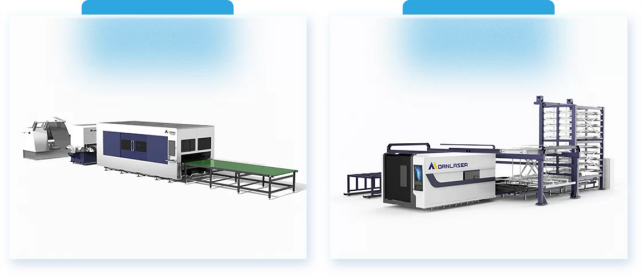-
Product
-
Fiber laser cutting machine
-
Profile Steel/ H-Beam Laser Cutter
high efficiency | high-performance | high quality -
Full Cover Fiber Laser Cutting Machine
supreme configuration | high precision | safe & pollution-free -
Sheet fiber laser cutting machine
tailor-made machine | efficiency boost -
Fiber Laser Bevel Cutting Machine
one-shot bevel | efficiency boost | streamlined process -
High precision fiber laser cutting machine
High precision | small footprint | fully enclosed -
Four-chuck Tube Cutting Lasers
truly zero-tailing | low cost per part | auto loader -
Three-chuck Tube Laser Cutting Machine
top production output | low cost per part | extremely short tailing -
Two-chuck Tube Laser Cutting Machine
top production output | low cost per part | extremely short tailing -
Full Enclosed Fiber Laser Cutting Machine
Integrated design saves installation time and shipping costs. - flexible processing | continuous cutting | efficient production
-
Fully Automatic Loading & Unloading Laser Cutting Production Line
intelligent production | optimizing factory space | reduce labor costs -
Sheet and Tube Fiber Laser Cutting Machine
supreme cost-effectiveness | dual-use laser | space-saving
-
-
Fiber laser welding machine
-
Air-cooled Portable Laser Welding Machine
more flexibility | easy to use | cost effective -
Automatic laser welding machine
fine welding seam | boosted efficiency -
Integrated fiber laser welding machine
instant welding | easy to operate & move -
Handheld fiber laser welding machine
long distance welding | multi-welding modes
-
- Fiber laser cleaning machine
- Bending Machine
-
Fiber laser cutting machine
- Solutions
- Why Morn Laser
- Price
- Contact
- VR
Menu
X- home
-
Product >
-
How the Automotive Industry Benefits from Laser Cutting Automation
2025-08-13The automotive industry is under constant pressure to improve productivity, reduce costs, and maintain precision — all while keeping up with evolving vehicle designs. Automated laser cutting has emerged as a game-changing technology in this space. In this article, we explore how automotive manufacturers are leveraging laser cutting machines to stay competitive and future-ready.
1. Meeting the Demands of Modern Vehicle Design
Automotive components are becoming more complex due to the rise of electric vehicles, lighter weight structures, and crash safety standards. Traditional cutting methods struggle with intricacy and thin-wall geometries. Laser cutting, on the other hand, offers unmatched precision for cutting parts like battery enclosures, seat brackets, and crash bars.
fiber laser cutting systems allow for precise, distortion-free cutting of intricate automotive components — regardless of the complexity or material.
2. Handling High Volume with Repeatable Quality
Car manufacturing requires high-speed, consistent output. Manual operations often introduce variability, increasing rejection rates and production costs.
With automation, fiber laser cutters ensure every part is identical, even in large-scale production. Integration with robotic arms and smart loading systems reduces downtime and labor dependency.
3. Compatibility with a Wide Range of Metals
From aluminum panels to ultra-high-strength steel for car frames, the variety of materials in automotive production is vast.
Fiber laser cutters can handle multiple metals and thicknesses with minimal setup changes. This flexibility is ideal for manufacturers producing different car models or parts on the same production line.
4. Reduced Waste and Lower Tooling Costs
Stamping and mechanical cutting often lead to material waste and require costly die changes.
Laser cutting is a non-contact process, which minimizes wear and eliminates the need for mechanical tooling. Nesting software also optimizes raw material usage, reducing scrap.
5. Integration with Smart Manufacturing Systems
The automotive sector is increasingly adopting Industry 4.0 practices — and that includes laser cutting systems.
Our laser cutting machines can be integrated with MES and ERP systems, offering real-time data for better scheduling, maintenance, and inventory planning.
Laser cutting automation is no longer optional — it's essential for automakers looking to remain competitive in today's fast-changing market. Whether you're producing EV battery trays or structural chassis components, laser systems provide the speed, flexibility, and accuracy your line demands.
Looking to optimize your automotive part production with cutting-edge laser technology? Contact Morn Laser today for a free consultation or sample test. Let's build smarter, together.
- Office Address:
- 17F, Building 5, Qisheng Mansion High-Tech Zone, Jinan, Shandong 250101, China
- Email: info@mornlaser.com
- Mobile/WhatsApp/WeChat: +86 151 6916 6350
CONTACT USCopyright © 2008-2022 Morn Laser All Rights Reserved.![]() Get a Quote
Get a Quote
![]() Get a Quote
Get a Quote
Cookies
We use cookies to improve our services and remember your choice for future visits. By clicking "Accept cookies", you consent to the use of cookies on this website.
Read our Privacy Policy
Get a Quote x
![]()








